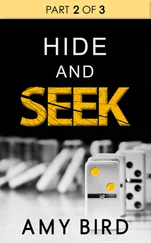Уилки Коллинз - Hide and Seek
Здесь есть возможность читать онлайн «Уилки Коллинз - Hide and Seek» весь текст электронной книги совершенно бесплатно (целиком полную версию без сокращений). В некоторых случаях можно слушать аудио, скачать через торрент в формате fb2 и присутствует краткое содержание. Год выпуска: 2005, Жанр: Классическая проза, на английском языке. Описание произведения, (предисловие) а так же отзывы посетителей доступны на портале библиотеки ЛибКат.
- Название:Hide and Seek
- Автор:
- Жанр:
- Год:2005
- ISBN:нет данных
- Рейтинг книги:5 / 5. Голосов: 1
-
Избранное:Добавить в избранное
- Отзывы:
-
Ваша оценка:
- 100
- 1
- 2
- 3
- 4
- 5
Hide and Seek: краткое содержание, описание и аннотация
Предлагаем к чтению аннотацию, описание, краткое содержание или предисловие (зависит от того, что написал сам автор книги «Hide and Seek»). Если вы не нашли необходимую информацию о книге — напишите в комментариях, мы постараемся отыскать её.
Hide and Seek — читать онлайн бесплатно полную книгу (весь текст) целиком
Ниже представлен текст книги, разбитый по страницам. Система сохранения места последней прочитанной страницы, позволяет с удобством читать онлайн бесплатно книгу «Hide and Seek», без необходимости каждый раз заново искать на чём Вы остановились. Поставьте закладку, и сможете в любой момент перейти на страницу, на которой закончили чтение.
Интервал:
Закладка:
“Do I understand you, my dear sir,” interposed Mr. Thorpe, sorrowfully sarcastic, “to be praising the conduct of my son in disturbing the congregation, and obliging me to take him out of church?”
“Nothing of the sort,” retorted the old gentleman; “I’m not praising Zack’s conduct, but I am blaming yours. Here it is in plain words:— You keep on cramming church down his throat; and he keeps on puking at it as if it was physic, because he don’t know any better, and can’t know any better at his age. Is that the way to make him take kindly to religious teaching? I know as well as you do, that he roared like a young Turk at the sermon. And pray what was the subject of the sermon? Justification by Faith. Do you mean to tell me that he, or any other child at his time of life, could understand anything of such a subject as that; or get an atom of good out of it? You can’t—you know you can’t! I say again, it’s no use taking him to church yet; and what’s more, it’s worse than no use, for you only associate his first ideas of religious instruction with everything in the way of restraint and discipline and punishment that can be most irksome to him. There! that’s my opinion, and I should like to hear what you’ve got to say against it?”
“Latitudinarianism,” said Mr. Thorpe, looking and speaking straight at the portrait of the Reverend Aaron Yollop.
“You can’t fob me off with long words, which I don’t understand, and which I don’t believe you can find in Johnson’s Dictionary,” continued Mr. Goodworth doggedly. “You would do much better to take my advice, and let Zack go to church, for the present, at his mother’s knees. Let his Morning Service be about ten minutes long; let your wife tell him, out of the New Testament, about Our Savior’s goodness and gentleness to little children; and then let her teach him, from the Sermon on the Mount, to be loving and truthful and forbearing and forgiving, for Our Savior’s sake. If such precepts as those are enforced—as they may be in one way or another—by examples drawn from his own daily life; from people around him; from what he meets with and notices and asks about, out of doors and in—mark my words, he’ll take kindly to his religious instruction. I’ve seen that in other children: I’ve seen it in my own children, who were all brought up so. Of course, you don’t agree with me! Of course you’ve got another objection all ready to bowl me down with?”
“Rationalism,” said Mr. Thorpe, still looking steadily at the lithographed portrait of the Reverend Aaron Yollop.
“Well, your objection’s a short one this time at any rate; and that’s a blessing!” said the old gentleman rather irritably. “Rationalism—eh? I understand that ism, I rather suspect, better than the other. It means in plain English, that you think I’m wrong in only wanting to give religious instruction the same chance with Zack which you let all other kinds of instruction have—the chance of becoming useful by being first made attractive. You can’t get him to learn to read by telling him that it will improve his mind—but you can by getting him to look at a picture book. You can’t get him to drink senna and salts by reasoning with him about its doing him good—but you can by promising him a lump of sugar to take after it. You admit this sort of principle so far, because you’re obliged; but the moment anybody wants (in a spirit of perfect reverence and desire to do good) to extend it to higher things, you purse up your lips, shake your head, and talk about Rationalism—as if that was an answer! Well! well! it’s no use talking—go your own way—I wash my hands of the business altogether. But now I am at it I’ll just say this one thing more before I’ve done:—your way of punishing the boy for his behavior in church is, in my opinion, about as bad and dangerous a one as could possibly be devised. Why not give him a thrashing, if you must punish the miserable little urchin for what’s his misfortune as much as his fault? Why not stop his pudding, or something of that sort? Here you are associating verses in the Bible, in his mind, with the idea of punishment and being locked up in the cold! You may make him get his text by heart, I dare say, by fairly tiring him out; but I tell you what I’m afraid you’ll make him learn too, if you don’t mind—you’ll make him learn to dislike the Bible as much as other boys dislike the birch-rod!”
“Sir,” cried Mr. Thorpe, turning suddenly round, and severely confronting Mr. Goodworth, “once for all, I must most respectfully insist on being spared for the future any open profanities in conversation, even from your lips. All my regard and affection for you, as Mrs. Thorpe’s father, shall not prevent me from solemnly recording my abhorrence of such awful infidelity as I believe to be involved in the words you have just spoken! My religious convictions recoil—”
“Stop, sir!” said Mr. Goodworth, seriously and sternly.
Mr. Thorpe obeyed at once. The old gentleman’s manner was generally much more remarkable for heartiness than for dignity; but it altered completely while he now spoke. As he struck his hand on the table, and rose from his chair, there was something in his look which it was not wise to disregard.
“Mr. Thorpe,” he went on, more calmly, but very decidedly, “I refrain from telling you what my opinion is of the ‘respect’ and ‘affection’ which have allowed you to rebuke me in such terms as you have chosen. I merely desire to say that I shall never need a second reproof of the same kind at your hands; for I shall never again speak to you on the subject of my grandson’s education. If, in consideration of this assurance, you will now permit me, in my turn—not to rebuke—but to offer you one word of advice, I would recommend you not to be too ready in future, lightly and cruelly to accuse a man of infidelity because his religious opinions happen to differ on some subjects from yours. To infer a serious motive for your opponent’s convictions, however wrong you may think them, can do you no harm: to infer a scoffing motive can do him no good. We will say nothing more about this, if you please. Let us shake hands, and never again revive a subject about which we disagree too widely ever to discuss it with advantage.”
At this moment the servant came in with lunch. Mr. Goodworth poured himself out a glass of sherry, made a remark on the weather, and soon resumed his cheerful, everyday manner. But he did not forget the pledge that he had given to Mr. Thorpe. From that time forth, he never by word or deed interfered again in his grandson’s education.
While the theory of Mr. Thorpe’s system of juvenile instruction was being discussed in the free air of the parlor, the practical working of that theory, so far as regarded the case of Master Zack, was being exemplified in anything but a satisfactory manner, in the prison-region of the dressing-room.
While she ascended the first flight of stairs, Mrs. Thorpe’s ears informed her that her son was firing off one uninterrupted volley of kicks against the door of his place of confinement. As this was by no means an unusual circumstance, whenever the boy happened to be locked up for bad behavior, she felt distressed, but not at all surprised at what she heard; and went into the drawing-room, on her way up stairs, to deposit her Bible and Prayerbook (kept in a morocco case, with gold clasps) on the little side-table, upon which they were always placed during week-days. Possibly, she was so much agitated that her hand trembled; possibly, she was in too great a hurry; possibly, the household imp who rules the brittle destinies of domestic glass and china, had marked her out as his destroying angel for that day; but however it was, in placing the morocco case on the table, she knocked down and broke an ornament standing near it—a little ivory model of a church steeple in the florid style, enshrined in a glass case. Picking up the fragments, and mourning over the catastrophe, occupied some little time, more than she was aware of, before she at last left the drawing-room, to proceed on her way to the upper regions.
Читать дальшеИнтервал:
Закладка:
Похожие книги на «Hide and Seek»
Представляем Вашему вниманию похожие книги на «Hide and Seek» списком для выбора. Мы отобрали схожую по названию и смыслу литературу в надежде предоставить читателям больше вариантов отыскать новые, интересные, ещё непрочитанные произведения.
Обсуждение, отзывы о книге «Hide and Seek» и просто собственные мнения читателей. Оставьте ваши комментарии, напишите, что Вы думаете о произведении, его смысле или главных героях. Укажите что конкретно понравилось, а что нет, и почему Вы так считаете.











